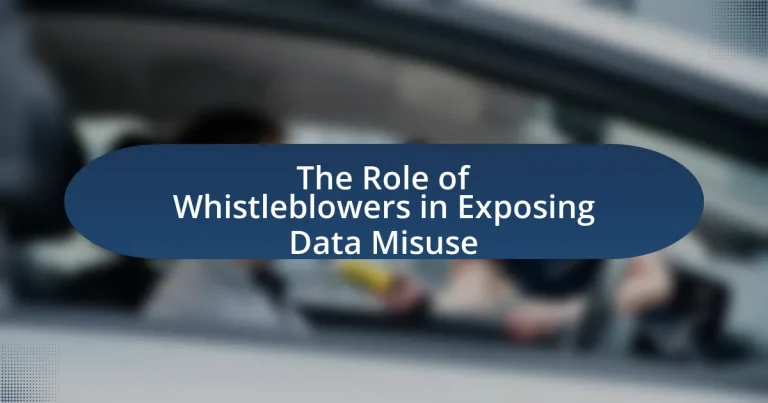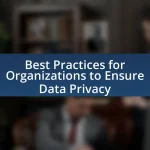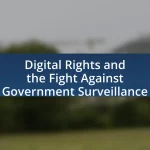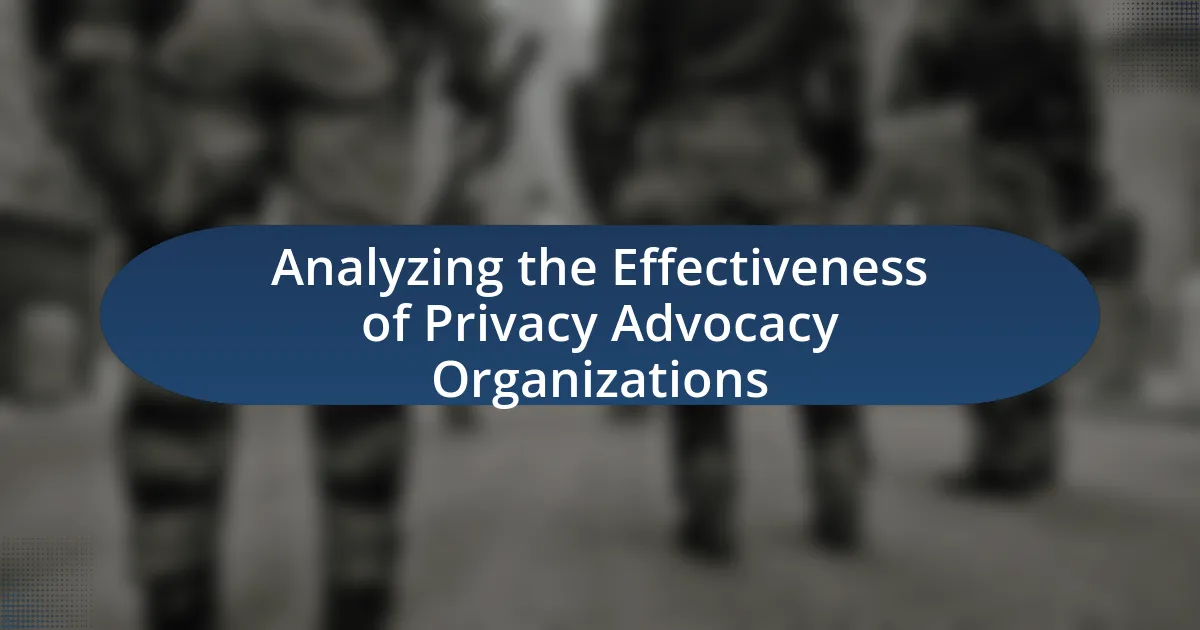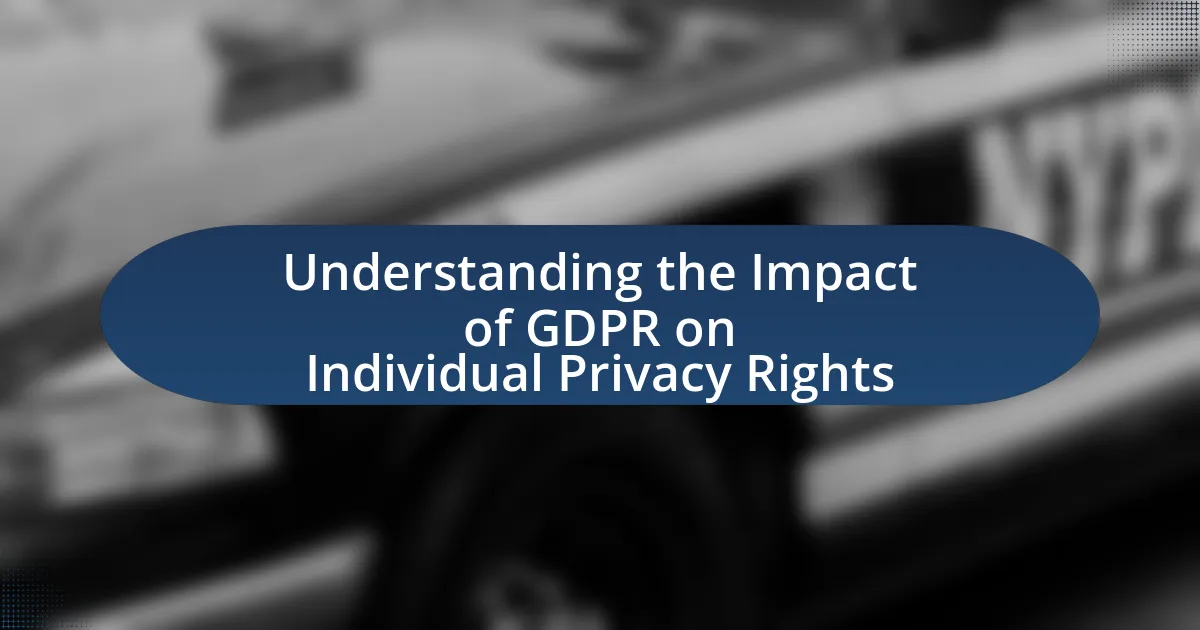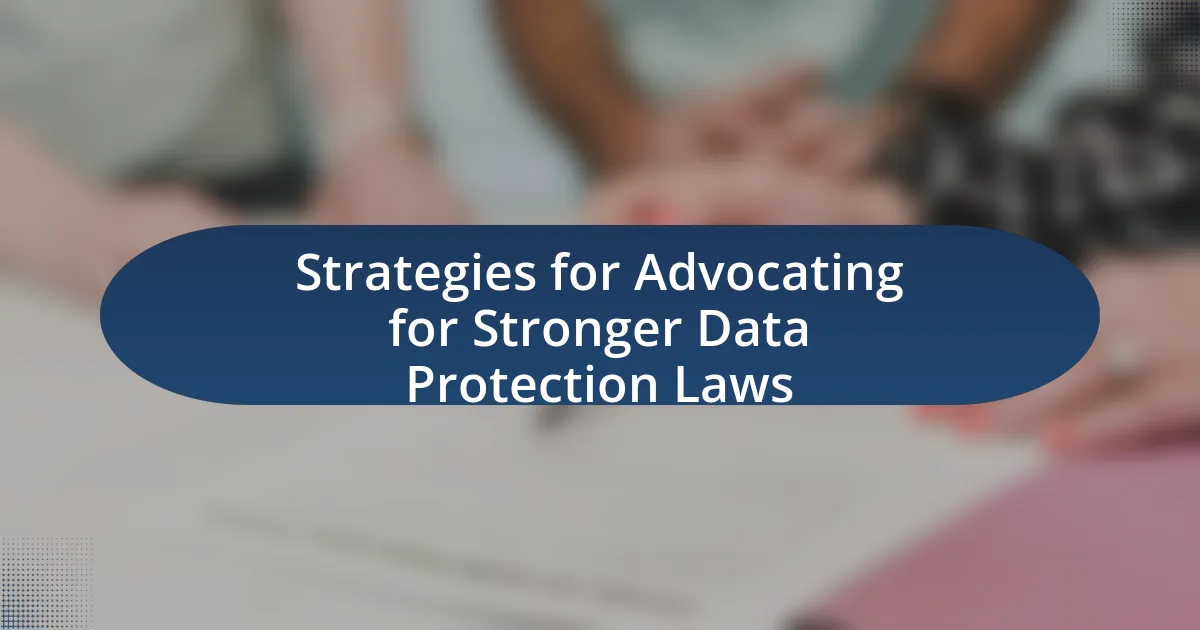Whistleblowers are individuals who expose unethical or illegal practices within organizations, playing a vital role in revealing data misuse. This article examines the significance of whistleblowers in identifying and reporting data misuse, the challenges they face, and the legal protections available to them. It highlights how their disclosures can lead to organizational accountability, public awareness, and necessary reforms in data management practices. Additionally, the article discusses best practices for whistleblowers to ensure their safety and the impact of their actions on societal norms regarding data privacy and ethics.
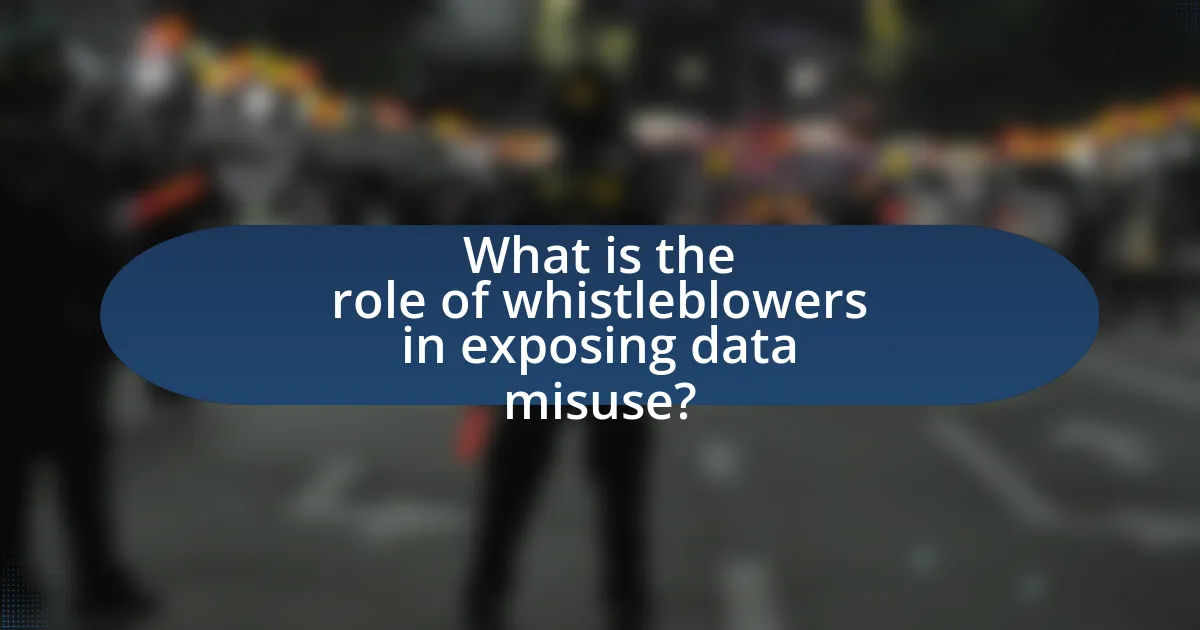
What is the role of whistleblowers in exposing data misuse?
Whistleblowers play a crucial role in exposing data misuse by providing insider information that reveals unethical or illegal practices within organizations. Their disclosures often lead to investigations and reforms, as seen in cases like Edward Snowden’s revelations about NSA surveillance, which prompted widespread debate on privacy and government overreach. Additionally, whistleblowers can help enforce compliance with data protection laws, such as the General Data Protection Regulation (GDPR), by reporting violations that threaten individuals’ privacy rights. Their actions not only protect the public interest but also encourage accountability and transparency in data management practices.
How do whistleblowers identify data misuse?
Whistleblowers identify data misuse by observing discrepancies in data handling practices, such as unauthorized access, manipulation, or inadequate security measures. They often rely on their insider knowledge of organizational processes and policies to detect anomalies that suggest unethical or illegal activities. For instance, a whistleblower may notice that sensitive information is being shared without proper authorization or that data is being altered to misrepresent facts. This identification process is supported by legal protections that encourage reporting, as seen in laws like the Whistleblower Protection Act in the United States, which safeguards individuals who disclose information about wrongdoing.
What signs indicate potential data misuse?
Signs that indicate potential data misuse include unauthorized access to sensitive information, unusual data access patterns, and discrepancies in data usage reports. Unauthorized access often manifests as logins from unfamiliar locations or devices, suggesting that individuals may be exploiting their access rights. Unusual data access patterns can be identified through analytics that reveal spikes in data retrieval or downloads that deviate from normal behavior, indicating potential breaches or misuse. Discrepancies in data usage reports, such as inconsistencies between reported data access and actual usage, can signal that data is being manipulated or misappropriated. These signs are critical for organizations to monitor in order to prevent and address data misuse effectively.
How do whistleblowers gather evidence of data misuse?
Whistleblowers gather evidence of data misuse by documenting incidents, collecting relevant documents, and recording communications that demonstrate unethical or illegal activities. They often take detailed notes of their observations, including dates, times, and specific actions taken by individuals or organizations. Additionally, whistleblowers may obtain internal reports, emails, or other digital communications that reveal discrepancies or violations of data handling protocols. This methodical approach ensures that the evidence is credible and can withstand scrutiny, as seen in cases like the Edward Snowden revelations, where extensive documentation supported claims of government surveillance abuses.
Why are whistleblowers important in the context of data misuse?
Whistleblowers are crucial in the context of data misuse because they provide insider information that can reveal unethical or illegal practices within organizations. Their disclosures often lead to investigations that can uncover significant breaches of data privacy, such as unauthorized data sharing or manipulation. For instance, the case of Edward Snowden highlighted how whistleblowers can expose government surveillance programs that misuse personal data, prompting global discussions on privacy rights and data protection laws. By bringing attention to these issues, whistleblowers play a vital role in promoting accountability and transparency, ultimately safeguarding individuals’ rights and fostering ethical standards in data management.
What impact do whistleblowers have on organizational accountability?
Whistleblowers significantly enhance organizational accountability by exposing unethical practices and misconduct within organizations. Their disclosures often lead to investigations, policy changes, and improved compliance measures, thereby fostering a culture of transparency. For instance, the Sarbanes-Oxley Act of 2002 was enacted in response to corporate scandals, emphasizing the importance of whistleblower protections in promoting accountability. Research indicates that organizations with robust whistleblower programs experience a 50% reduction in fraud incidents, demonstrating the tangible impact of whistleblowers on maintaining ethical standards and accountability.
How do whistleblowers contribute to public awareness of data misuse?
Whistleblowers contribute to public awareness of data misuse by exposing unethical practices and breaches of data privacy within organizations. Their disclosures often reveal critical information that would otherwise remain hidden, prompting public discourse and scrutiny. For instance, the revelations by Edward Snowden about the NSA’s mass surveillance programs in 2013 led to widespread debate on privacy rights and government transparency, highlighting the importance of accountability in data handling. Such actions not only inform the public but also encourage regulatory reforms and foster a culture of ethical data management.
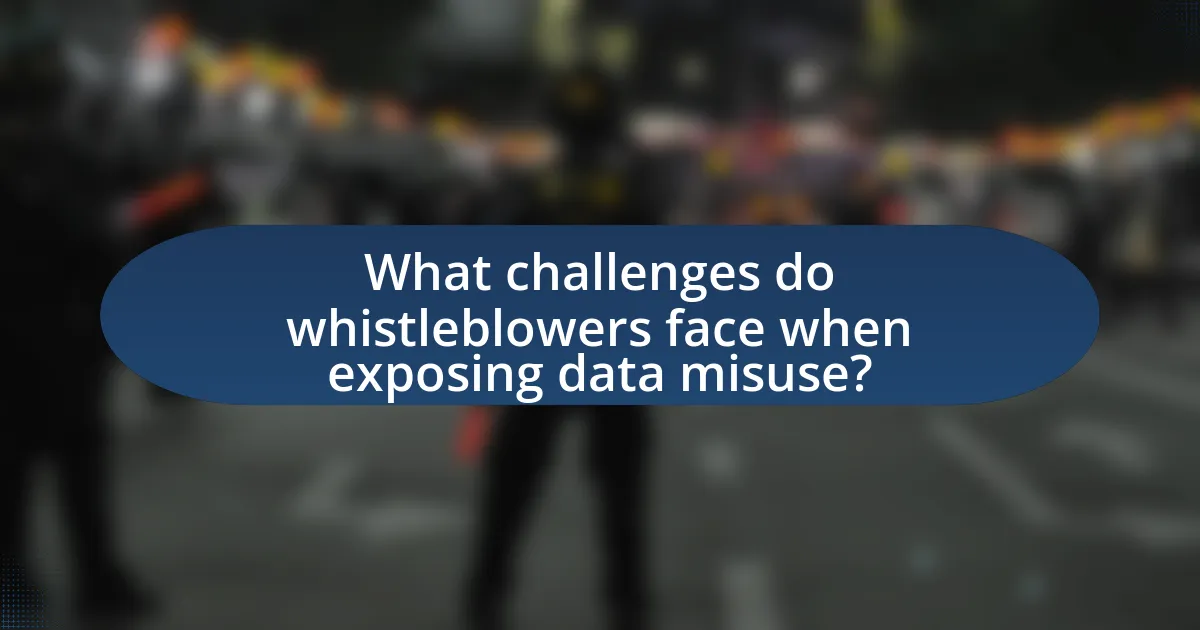
What challenges do whistleblowers face when exposing data misuse?
Whistleblowers face significant challenges when exposing data misuse, including retaliation, legal repercussions, and emotional distress. Retaliation can manifest as job loss, harassment, or professional ostracism, which is supported by studies indicating that nearly 70% of whistleblowers experience negative consequences in their careers. Legal repercussions may involve lawsuits or criminal charges, particularly if the whistleblower breaches confidentiality agreements. Emotional distress is also prevalent, as whistleblowers often endure stress, anxiety, and isolation due to their actions. These challenges create a daunting environment for individuals who seek to report unethical practices related to data misuse.
What legal protections exist for whistleblowers?
Legal protections for whistleblowers include various federal and state laws designed to shield individuals from retaliation when they report misconduct. The Whistleblower Protection Act (WPA) of 1989 is a key federal law that protects federal employees who disclose information they reasonably believe evidences a violation of laws, rules, or regulations, or gross mismanagement, waste, or abuse of authority. Additionally, the Sarbanes-Oxley Act provides protections for employees of publicly traded companies who report fraudulent activities. State laws may also offer protections, often varying by jurisdiction, which can include provisions against wrongful termination and harassment. These legal frameworks are essential in encouraging individuals to report wrongdoing without fear of adverse consequences.
How effective are these legal protections in practice?
Legal protections for whistleblowers are effective in practice, as they significantly reduce the risk of retaliation and encourage reporting of data misuse. Studies indicate that jurisdictions with strong whistleblower laws, such as the United States under the Whistleblower Protection Act, show higher rates of reporting and successful legal outcomes for whistleblowers. For instance, the Government Accountability Office reported that whistleblower complaints increased by 20% in the years following the enactment of stronger protections, demonstrating their impact on encouraging individuals to come forward.
What are the potential repercussions for whistleblowers?
Whistleblowers may face various repercussions, including retaliation, job loss, legal consequences, and social ostracism. Retaliation can manifest as harassment, demotion, or termination from employment, as evidenced by a 2018 report from the U.S. Office of Special Counsel, which found that 54% of whistleblowers experienced adverse actions after reporting misconduct. Legal consequences may arise if the whistleblower breaches confidentiality agreements or if their disclosures are deemed unprotected under whistleblower laws. Additionally, social ostracism can occur, leading to isolation from colleagues and damage to personal relationships. These repercussions highlight the significant risks associated with whistleblowing, despite its critical role in exposing data misuse.
How can organizations support whistleblowers?
Organizations can support whistleblowers by implementing robust protection policies and providing clear reporting channels. Establishing a confidential reporting system encourages individuals to come forward without fear of retaliation. According to a study by the Ethics & Compliance Initiative, organizations with strong whistleblower protections experience a 50% increase in reporting of misconduct. Additionally, offering legal support and counseling services can further empower whistleblowers, ensuring they feel safe and supported throughout the process.
What policies can organizations implement to protect whistleblowers?
Organizations can implement several policies to protect whistleblowers, including establishing clear reporting procedures, ensuring confidentiality, and prohibiting retaliation. Clear reporting procedures allow employees to report misconduct safely and effectively, while confidentiality policies protect the identity of whistleblowers, encouraging them to come forward without fear. Prohibiting retaliation is crucial; organizations should enforce strict consequences for any form of harassment or discrimination against whistleblowers. According to the U.S. Whistleblower Protection Act, these measures are essential to create a safe environment for reporting wrongdoing, thereby fostering a culture of transparency and accountability.
How can organizations foster a culture of transparency?
Organizations can foster a culture of transparency by implementing clear communication channels and encouraging open dialogue among employees. Establishing regular meetings and feedback sessions allows team members to voice concerns and share information freely. Research indicates that organizations with transparent practices experience higher employee engagement and trust, which can lead to improved performance and reduced misconduct. For instance, a study by the Ethics & Compliance Initiative found that organizations with strong ethical cultures report 50% fewer incidents of misconduct. By prioritizing transparency, organizations not only empower employees but also create an environment where whistleblowers feel safe to report data misuse without fear of retaliation.
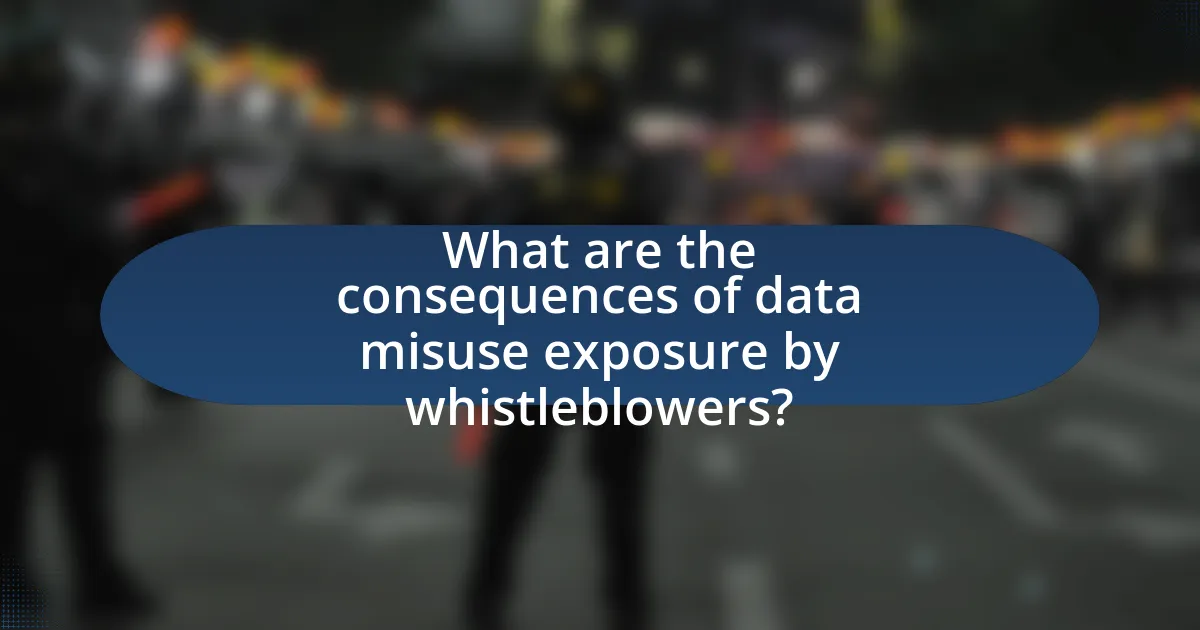
What are the consequences of data misuse exposure by whistleblowers?
The consequences of data misuse exposure by whistleblowers include legal repercussions for the organizations involved, potential financial penalties, and reputational damage. When whistleblowers reveal data misuse, organizations may face lawsuits or regulatory actions, as seen in cases like the 2013 Edward Snowden revelations, which led to significant scrutiny and reforms in U.S. intelligence practices. Additionally, companies may incur substantial fines, such as the $5 billion penalty imposed on Facebook for privacy violations following whistleblower disclosures. Reputational damage can result in loss of consumer trust and market share, as evidenced by the fallout experienced by companies like Equifax after their data breach was exposed.
What changes can occur within organizations after a whistleblower exposes data misuse?
Organizations can undergo significant changes after a whistleblower exposes data misuse, including policy revisions, increased oversight, and cultural shifts towards transparency. Following such exposure, companies often implement stricter data governance policies to prevent future incidents, as seen in cases like the 2013 Target data breach, which led to enhanced security measures and employee training programs. Additionally, organizations may establish or strengthen whistleblower protection policies to encourage reporting and foster a safer environment for employees. This shift can result in a more ethical workplace culture, as evidenced by studies showing that organizations with robust whistleblower protections tend to have lower instances of misconduct.
How does exposing data misuse affect organizational policies and practices?
Exposing data misuse significantly impacts organizational policies and practices by prompting immediate reviews and revisions of data governance frameworks. Organizations often respond to such exposures by implementing stricter compliance measures, enhancing data protection protocols, and fostering a culture of transparency and accountability. For instance, after the Cambridge Analytica scandal, many companies reassessed their data handling practices, leading to the introduction of more robust privacy policies and employee training programs on ethical data use. This shift not only mitigates risks associated with data breaches but also aligns organizational practices with regulatory requirements, such as the General Data Protection Regulation (GDPR), which emphasizes the importance of data integrity and user consent.
What are the broader societal implications of whistleblowing on data misuse?
Whistleblowing on data misuse has significant societal implications, primarily fostering accountability and transparency within organizations. When individuals expose unethical practices, it can lead to regulatory changes, as seen in cases like the Cambridge Analytica scandal, which prompted discussions on data privacy laws and reforms. Additionally, whistleblowing can empower other employees to speak out, creating a culture of integrity and ethical behavior in workplaces. This collective action can enhance public trust in institutions, as demonstrated by the increased scrutiny and reform in data handling practices following high-profile whistleblower cases. Ultimately, the act of whistleblowing serves as a catalyst for societal change, promoting a more responsible approach to data management and protection.
What best practices should whistleblowers follow when reporting data misuse?
Whistleblowers should document all evidence of data misuse meticulously before reporting. This includes gathering emails, documents, and any relevant communications that substantiate the claim. Additionally, they should familiarize themselves with the organization’s reporting procedures and legal protections available to whistleblowers, such as the Whistleblower Protection Act in the United States, which safeguards individuals from retaliation. It is also advisable for whistleblowers to report the misuse to a designated authority within the organization or an external regulatory body, ensuring that they maintain confidentiality to protect their identity. Following these best practices increases the likelihood of a thorough investigation and minimizes personal risk.
How can whistleblowers ensure their safety and anonymity?
Whistleblowers can ensure their safety and anonymity by utilizing secure communication channels, such as encrypted messaging apps, and by reporting through established whistleblower protection programs. These programs, like the Whistleblower Protection Act in the United States, provide legal safeguards against retaliation and help maintain confidentiality. Additionally, whistleblowers should avoid sharing personal information that could reveal their identity and consider using anonymous reporting platforms that do not require personal identification. Research indicates that effective anonymity measures significantly reduce the risk of retaliation, thereby encouraging more individuals to come forward with information about data misuse.
What steps should whistleblowers take to document their findings effectively?
Whistleblowers should take the following steps to document their findings effectively: first, they must gather all relevant evidence, including emails, reports, and witness statements, to substantiate their claims. This evidence should be organized chronologically and categorized by type to facilitate clarity. Next, whistleblowers should create a detailed account of the events, including dates, times, locations, and individuals involved, ensuring that the narrative is factual and objective. Additionally, they should maintain a secure record of all documentation, using encrypted storage solutions to protect sensitive information from unauthorized access. Finally, whistleblowers should consider consulting legal counsel to ensure that their documentation meets the necessary legal standards for reporting misconduct. These steps are crucial as they enhance the credibility of the whistleblower’s claims and provide a solid foundation for any potential investigations.
